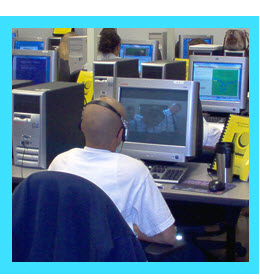
"The Learning Center of
Ellis County,
whose effects are enduring,
is a tremendous asset
to the region and
school district."
Anita Scheve, Learning Center Coordinator
The Learning Center of Ellis County
Kansas
The Learning Center of Ellis County—managed by Hays (Kansas) Unified School District #489—was founded to help recent high school dropouts graduate. But recognizing that the issues leading many youth to drop out—including poverty, teen pregnancy, and out-of-home placements—were related to broader issues in the community, the center cycled back through the Partner-Plan-Act process to determine how it could evolve to address those issues by expanding the reach of the center’s educational services.
Center staff knew that to expand their offerings beyond youth in a way that was sustainable, they would have to answer several key questions:
- How would they attract and retain students?
- How would they fund additional programming?
- What other resources would be needed to support adult learners?
Their first step was to explore the community’s needs. They discovered many barriers that adults in their community may experience in furthering their education: lack of transportation, lack of childcare, and low English language and literacy skills. Adults also had a strong desire to learn practical skills that could be applied directly to a job. To attract students and to gain support from the community, the Learning Center set out to address these challenges.
One step the center took was to become a licensed virtual classroom, allowing students from all over Kansas to earn credits anywhere through the Internet. This helps support adults who do not have transportation, who have young children, or who work full-time. The center also provides childcare, summer classes, English-as-a-second-language courses, laptops, and classes in technology.
The Learning Center’s efforts have proven successful in attracting students. In its 13-year existence, 242 students have graduated from The Learning Center of Ellis County, having a direct economic impact of over $92 million. It has also helped hundreds of other students successfully graduate via credit recovery and summer school and over one hundred adults have learned English as a second language.
To ensure that students continue to enroll, the center collects formal data that helps them understand if their offerings are valuable and relevant to participants. The center also gathers information about the community in general. These data are then used to communicate successes to partners and local stakeholders, who include mental health providers, early childhood education providers, and state agency staff. These groups can then refer clients to the center and, depending on their partnership, may also support the Learning Center with expertise or resources. Sharing data about the program also helps community-serving agencies understand what services are already available in the community, thus avoiding duplication and conserving resources.
By providing adult education—and compiling data on attendance—the Learning Center is able to receive funding from the state of Kansas, which funds adult education to the same degree that it funds K–12. This funding source means that the center can be managed by the school district, which also covers many of the Learning Center’s costs. In all, the state gives full tuition for 80–100 students per year; the remaining students pay on a sliding scale. This diversified funding strategy and support from community partners helps ensure long-term capacity.
Learning Center coordinator Anita Scheve says “that as long as the legislature continues to fund adult education, the organization will remain self-sustaining and continue to be a vital part of the community.”